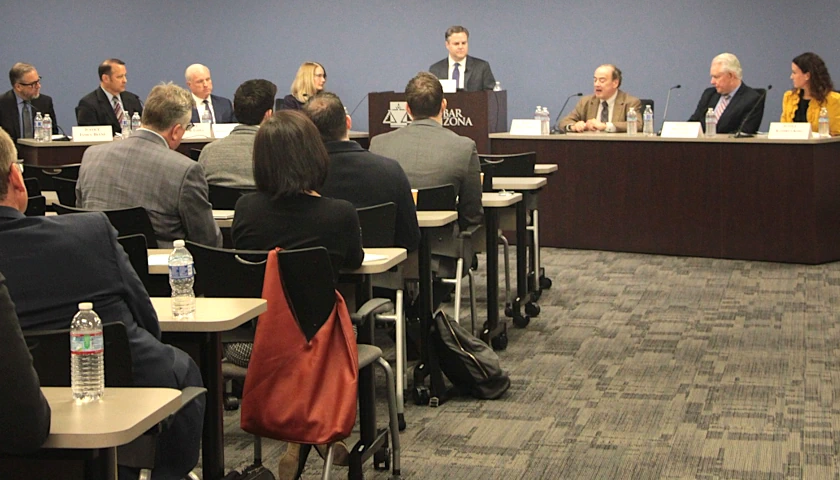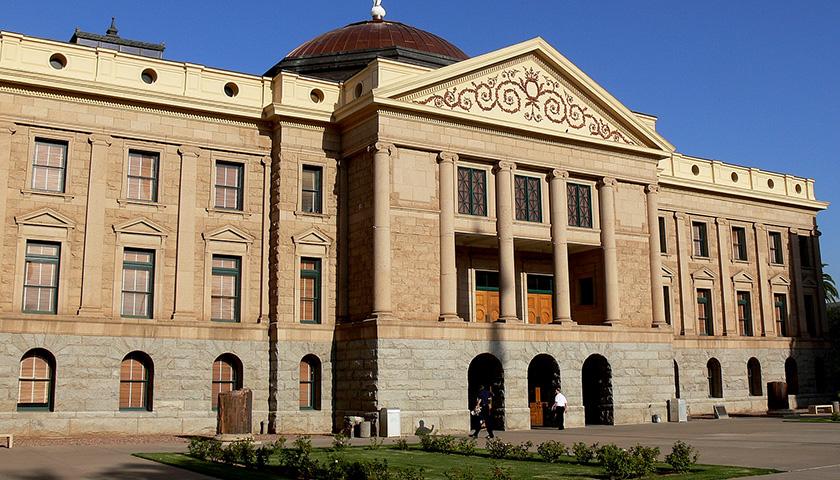The Arizona Supreme Court, which oversees the State Bar of Arizona (SBA), is considering proposed changes to the SBA, and approved one temporary emergency rule change Friday. The SBA, whose leadership is dominated by progressives, has come under intense criticism in recent years for targeting conservative attorneys, especially election attorneys. The court adopted R-24-0046 as an emergency rule in order to allow it to go into effect temporarily before the 2024 general election. It limits the ability of those who have no connection to a matter to file a complaint against an attorney.
The justices are reviewing 70 total rule change petitions, and will decide whether to adopt, adopt with amendment, reject, or continue a change. Changes resulting from this process will then be referred to a study committee for further consideration. The rule change process began in January, with proposals offered to the public for comment. The justices are expected to make their decisions on all 70 rule change petitions within the next few days. Most rules that are adopted will go into effect in January.
R-24-0046 will reduce the access that complainants have to the bar complaint process if they have no connection to the complaint, such as receiving updates and the ability to appeal. Instead, if the SBA believes the accusations are valid, the quasi-governing body will become the complainant instead of the person who filed the complaint.
The SBA said there have been at least 40 election-related cases submitted since November 2020. Arizona Supreme Court Chief Justice Ann Timmer said the court will consider whether to adopt the rule permanently at its Rules Agenda meeting in December.
The 65 Project, which was formed to target conservative election attorneys in the wake of the 2020 elections, has filed complaints against several conservative election attorneys in Arizona, including Kari Lake’s attorneys Kurt Olsen and Andrew Parker. A disciplinary panel for the SBA recently exonerated the pair from all alleged ethics violations over filing a lawsuit representing Lake and Mark Finchem that challenged the use of voting machine tabulators.
According to the Arizona Capitol Times, since 2021, attorney Dianne Post filed 22 complaints against election attorneys who she claimed had “filed many false and fraudulent claims without legal facts or legal analysis in the Arizona courts, and wasted a lot of time and money.” Post submitted a comment opposing the rule change.
While the proposed rule would limit the ability of The 65 Project and Post to be as involved in complaints, it will also limit the ability of conservatives attempting to hold unethical progressive attorneys accountable. There were nine comments posted in response to R-24-0046. Similar efforts to pass bills in the Arizona Legislature revising this have failed.
Another proposed change would bifurcate the SBA’s regulatory and non-regulatory functions in order to eliminate the SBA’s authority to collect mandatory dues for functions that have nothing to do with lawyer regulation. R-24-0030, which was submitted by the Goldwater Institute (GI), seeks to end the practice of using mandatory dues for political purposes.
GI attorney Stacy Skankey pointed out in GI’s proposed rule change petition that state bars around the country are increasingly adopting this rule, since the Supreme Court held as recently as 2018 that the practice violates the First Amendment. Skankey said, “Those states that have not yet done so are likely to be required to, soon.” Additionally, “Given that the Arizona Constitution provides stronger protections for freedoms of expression and association than the First Amendment does, this Court should accord greater attention to the free speech issues addressed in those federal cases.”
Skankey also noted that Arizona is a right-to-work state, yet unlike other professions in Arizona, attorneys are forced to join the SBA in order to practice law. The GI rule change petition went over numerous frivolous ways the SBA spends members’ dues, such as “a news release about George Floyd and its position on diversity,” water-cooler hot topics [and] trivia about cranberry sauce.” There are 25 comments on the proposed rule.
Another rule proposed by GI, R-24-0028, would streamline the process for attorneys admitted in other jurisdictions to practice law in Arizona.
R-24-0006 would amend the Arizona Code of Judicial Conduct to allow judges to give pro se litigants more leeway. While all of the Justices of the Peace in Maricopa County support the proposed rule, prosecutors oppose it. The Arizona Prosecuting Attorneys’ Advisory Council (APAAC) submitted a comment expressing concern that it treats pro se plaintiffs differently in the justice system, and allows them to violate rules that attorneys are required to follow.
However, support is increasing for more flexibility with pro se litigants, since conservative attorneys are being increasingly targeted and disbarred, and many are too afraid to take on controversial political cases.
R-24-0003 would amend ethics rules to clarify the obligations of government attorneys. One of its proposed revisions would prohibit government attorneys from prosecuting their clients. In the late 2000s, former Maricopa County Attorney Andrew Thomas attempted to prosecute Maricopa County Supervisors for corruption, and obtained indictments against two of them until he was thwarted by judges. While opponents criticized him for the prosecutions, case law established that it was permissible. The rule change, which was submitted by Arizona Supreme Court Justice William Montgomery, would make it more difficult to prosecute corrupt officials.
The Arizona Legislature has tried unsuccessfully for over 10 years to pass significant reforms to the SBA in order to stop the targeting of conservative attorneys, but has had no success due to usually a single Republican — often an attorney who fears the SBA — voting with the Democrats to oppose the reforms.
– – –
Rachel Alexander is a reporter at The Arizona Sun Times and The Star News Network. Follow Rachel on Twitter / X. Email tips to [email protected].
Photo “Arizona State Bar” by Arizona State Bar Association.





